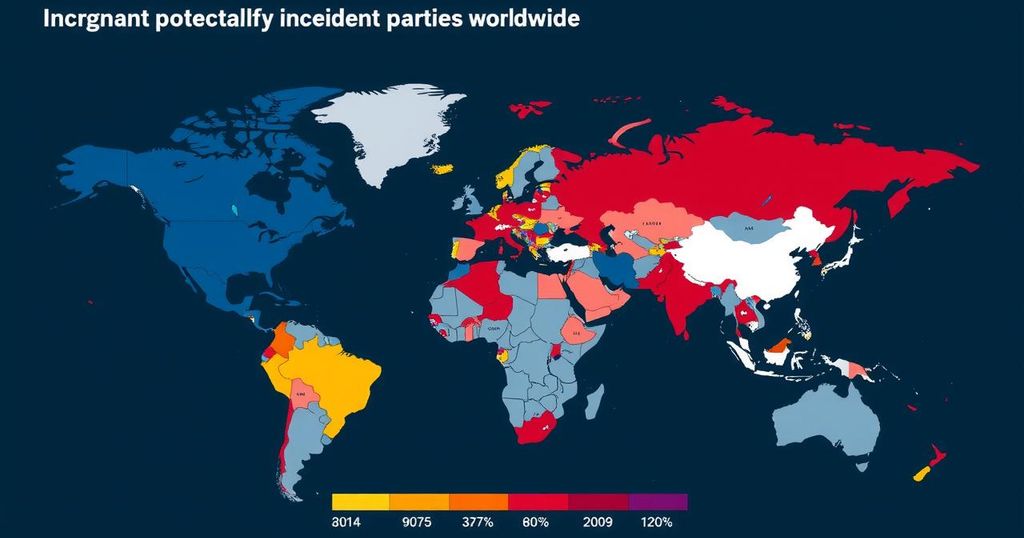Global Trends and the Democratic Party’s Electoral Challenges in 2023

This article examines the recent electoral outcomes for incumbent parties worldwide, focusing on the Democratic Party’s relatively mild losses compared to significant defeats in other democracies. It outlines the factors contributing to voter dissatisfaction, including economic concerns and shifts in priorities, while noting that the U.S. economy’s relatively stable performance may have cushioned Democratic losses. Ultimately, it suggests potential opportunities for the party in the next electoral cycle.
In the wake of recent elections, a global trend has emerged where incumbent parties, including the Democrats in the United States, have faced significant losses. As analysts dissect Vice President Kamala Harris’s campaign, it is crucial to recognize that her challenges were not unique but rather part of a broader international landscape characterized by widespread discontent among voters. Many democracies experienced a shift in voter sentiment during this election cycle, leading to substantial losses for incumbent political parties. Research indicates that over 80 percent of democracies that held elections this year saw a decline in electoral support for the incumbent party. This pattern of dissent is evident across various nations, including Japan, Botswana, and South Africa, where longstanding political parties either lost their majorities or faced the harsh reality of coalition governance. Notably, the election outcomes in Senegal and Sri Lanka underline a growing trend of opposition victories, reflecting a pivotal shift in voter priorities. Despite a general sense of voter dissatisfaction globally, Democrats in the U.S. managed relatively minor losses in comparison to their counterparts elsewhere. Reports reveal that Democrats recorded one of the least significant declines in vote share among incumbent parties in high-income countries. The U.S. economy’s performance, characterized by robust GDP growth and wage increases, provided a contrasting backdrop to the struggles faced by many other nations grappling with inflation and economic stagnation. However, these positive indicators did not fully obscure the pressing concerns surrounding inflation and the escalating costs of living that dominated the electoral discourse. A factor contributing to the Democrats’ electoral resilience may be attributed to the relative performance of the U.S. economy. While support for incumbents often hinges on strong economic performance, this year’s successful incumbents relied more on security-focused campaigns addressing national concerns. In contrast, issues surrounding national security did not take precedence in the U.S. campaign, which may have contributed to the Democrats’ challenges at the polls. The trend of incumbents facing electoral challenges is a reflection of widespread citizen discontent post-pandemic, fueled by economic anxiety and dissatisfaction with political direction. As the results unfold, there remains a glimmer of hope for the Democratic Party; assuming the patterns of voter behavior persist, they will have the opportunity to reclaim power in the next electoral cycle as challengers rather than incumbents.
This article discusses the broader implications of incumbent party losses in elections across democracies, with a specific focus on the recent challenges faced by the Democratic Party in the United States. Following pandemic-induced economic difficulties, a notable trend emerged where incumbent political entities worldwide suffered significant electoral setbacks. The analysis emphasizes the international context of voter dissatisfaction and the impact of economic indicators on electoral outcomes. By comparing the performance of Democrats against global trends, it provides insights into the reasons behind the party’s electoral experience and speculates on future opportunities for recovery.
In conclusion, the Democratic Party’s recent electoral performance mirrors a global trend of discontent directed towards incumbent parties following the challenges of the COVID-19 pandemic. Although they encountered difficulties, Democrats performed better relative to numerous other nations, aided by a stronger economic foundation. Nevertheless, ongoing voter concerns regarding inflation and cost-of-living issues persist, indicating that challenges remain. The outlook could improve in subsequent elections, offering Democrats a chance to reshape their political fortunes without the burden of incumbency.
Original Source: abcnews.go.com








